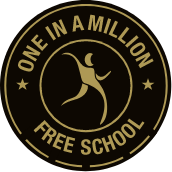English Language & Literature
At One In A Million Free School, the English department works to ensure that all students are prepared for their next destination, whether that be employment, an apprenticeship or further education. To that end we plan our curriculum strategically so that each student gains confidence in reading, writing and speaking in a variety of contexts and for a wide range of purposes.
Students are encouraged to reflect on how they learn so that they develop resilience and independence. A variety of recall tasks in every lesson ensures that key knowledge is retained and built upon, and a focus on weekly vocabulary lists helps students to develop reading comprehension across their studies, as well as fluency in their self-expression. Each student is also provided a dictionary as part of their equipment, supporting them in becoming self-sufficient in their learning and their progress in all subjects.
Students will develop their literacy through:
Reading:
Students will use a variety of reading strategies to understand and respond to literature, enabling them to develop culturally, intellectually and emotionally. They will study a range of texts including:
- Fiction: stories, play scripts, novels, and poetry from other cultures
- Non-fiction: reports, articles, advertisements, autobiographies and biographies, diary entries and web-based texts
- Bedrock Learning: weekly sessions will be used to promote reading progress, comprehension and reading for pleasure in preparation for GCSE examinations
Writing:
Students will use a variety of techniques to write fluently and accurately, using appropriate tone and language for a range of audiences and purposes, including:
- First and third person narrative – story writing and autobiographical writing
- Descriptive writing
- Writing to explain, inform, argue and persuade
- Letters, speeches and articles
Oracy:
- All students are expected to participate fully in paired, group and class discussions
- Students will understand the differences between spoken and written English,
Each unit of study includes a mid- and end-of-unit assessment, as well as ongoing formative assessments. Teaching staff provide frequent verbal and written feedback which identifies key strengths and areas for development, helping teachers to identify and address misconceptions, so that students make robust progress and understand how to reach or surpass their targets.
With an increasing emphasis on SPAG (Spelling, Punctuation, Accuracy and Grammar) in GCSE across several subjects, it is important to address spelling, punctuation and grammar in Key Stage 3 through explicit teaching and assessment of students’ work. We believe that the ability to write in a clear and accurate manner is essential to ensure our young people can confidently progress through their futures.
KEY STAGE 4
In Key Stage 4, language, reading and writing tasks are interwoven into the curriculum to ensure that all students are explicitly taught the skills needed for GCSE and beyond.
Students will write a variety of fiction and non-fiction texts including descriptive and narrative texts and letters, speeches and articles. Students will also be able to analyse the writer’s craft and intentions through analysis of language and structural techniques, characterisation and treatment of themes and motifs.
Spoken Language is also a vital component of the current GCSE model, and we coach our students to present and speak to their group of peers about a topic that they are passionate about. All students will be individually formally assessed at the end of Year 10 and their grade will be included on their GCSE certificates.
All students will sit two GCSE qualifications (WJEC) in English language and two in English literature, requiring them to analyse texts, showing a perceptive understanding of the authors’ methods, techniques and viewpoints. The language papers also require students to create fluent original texts in both fiction and transactional writing.
What Parents/Carers can do to help:
Encourage your child to use BBC Bitesize English Key Stage 3 and BBC Bitesize Key Stage 4. Your child has been given a Knowledge Organiser for each topic they study. This summarises the key information they must know if they are to be successful in this subject. Please encourage them to learn this off by heart and revise topics regularly.
